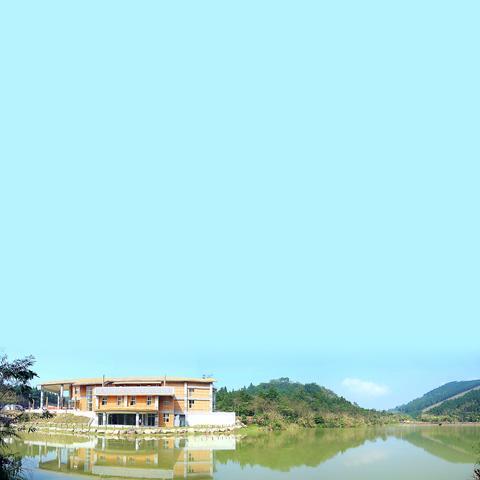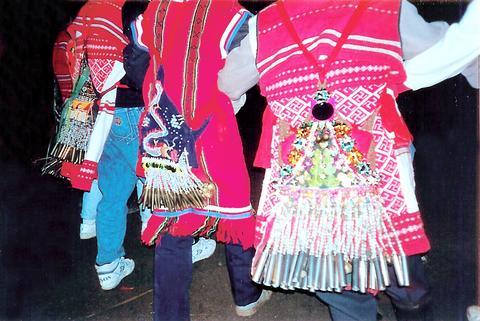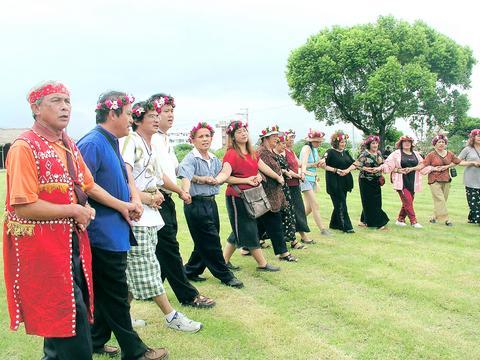Drinking, singing and dancing are expected to take place deep in the mountains of Miaoli and Hsinchu when the "Ritual of the Little Black People" (
For the past 100 years or so, the Saisiyat tribe (

PHOTO: TAIPEI TIMES
In fact, the short, black men the festival celebrates are one of the most ancient types of modern humans on this planet and their kin still survive in Asia today. They are said to be diminutive Africoids and are variously called Pygmies, Negritos and Aeta. They are found in the Philippines, northern Malaysia, Thailand, Sumatra in Indonesia and other places.

PHOTO: TAIPEI TIMES
Chinese historians called them "black dwarfs" in the Three Kingdoms period (AD 220 to AD 280) and they were still to be found in China during the Qing dynasty (1644 to 1911). In Taiwan they were called the "Little Black People" and, apart from being diminutive, they were also said to be broad-nosed and dark-skinned with curly hair.
After the Little Black People -- and well before waves of Han migrations after 1600 -- came the Aboriginal tribes, who are part of the Austronesian race. They are thought to have come from the Malay Archipelago 6,000 years ago at the earliest and around 1,000 years ago at the latest, though theories on Aborigine migration to Taiwan are still hotly debated. Gradually the Little Black People became scarcer, until a point about 100 years ago, when there was just a small group living near the Saisiyat tribe.

PHOTO: TAIPEI TIMES
The story goes that the Little Black People taught the Saisiyat to farm by providing seeds and they used to party together. But one day, the Little Black People sexually harassed some Aboriginal women. So, the Saisiyat took revenge and killed them off by cutting a bridge over which they were all crossing. Just two Little Black People survived. Before departing eastward, they taught the Saisiyat about their culture and passed down some of their songs, saying if they did not remember their people they would be cursed and their crops would fail.
The Saisiyat kept their promise and have held the Ritual of the Little Black People every year, though they scaled down the ceremonies during the Japanese colonial period (1895 to 1945). Now the ritual is held every two years on the 10th full moon of the lunar calendar, with a big festival once every 10 years. At this time, the Saisiyat are not supposed to fight and they congregate in their ancestral areas of Miaoli and Hsinchu, in the mountains.
"I've seen it written of as a celebration, but to me it seemed quite a mournful affair, especially in the way the music came across, which was trancelike, a haunting kind of chant with a series of 10 to 15 songs," said long-term Taiwan resident Lynn Miles, who has been to the ritual three times and will be going again this year.
"There's nothing else quite like it in its tone and in its mood. I've been to other festivals but this is non-stop."
Miles said the dances were not set pieces but usually involved holding hands and moving around in a circle, chanting, with those who know the songs doing most of the singing and a shaman figure keeping order.
A spokeswoman at the Council of Indigenous Peoples (under the Executive Yuan) said that those who have "unclean thoughts" have their souls snatched by the spirits of the Little Black People and will pass out until the shaman revives them.
Miles said the shaman seemed to serve a public-order function by chasing off those who were too drunk or out of order.
The ceremonies are held in two places. The ritual began yesterday in Nanchuang Township, Miaoli County, and will carry on there until Monday. Rituals start today in Wufeng Township, Hsinchu County, and will last through tomorrow.
Getting there:
To Wufeng:
Route 122 to Wufeng can be accessed off No. 1 Highway near Toufen.
To Nanchuang:
Take western No. 1 Highway. Near Toufen, take Route 124 toward Sanwan to Nanchuang. Shuttle buses will take visitors to the ritual site at Xiangtian Lake.

Taiwan has next to no political engagement in Myanmar, either with the ruling military junta nor the dozens of armed groups who’ve in the last five years taken over around two-thirds of the nation’s territory in a sprawling, patchwork civil war. But early last month, the leader of one relatively minor Burmese revolutionary faction, General Nerdah Bomya, who is also an alleged war criminal, made a low key visit to Taipei, where he met with a member of President William Lai’s (賴清德) staff, a retired Taiwanese military official and several academics. “I feel like Taiwan is a good example of

March 2 to March 8 Gunfire rang out along the shore of the frontline island of Lieyu (烈嶼) on a foggy afternoon on March 7, 1987. By the time it was over, about 20 unarmed Vietnamese refugees — men, women, elderly and children — were dead. They were hastily buried, followed by decades of silence. Months later, opposition politicians and journalists tried to uncover what had happened, but conflicting accounts only deepened the confusion. One version suggested that government troops had mistakenly killed their own operatives attempting to return home from Vietnam. The military maintained that the

Before the last section of the round-the-island railway was electrified, one old blue train still chugged back and forth between Pingtung County’s Fangliao (枋寮) and Taitung (台東) stations once a day. It was so slow, was so hot (it had no air conditioning) and covered such a short distance, that the low fare still failed to attract many riders. This relic of the past was finally retired when the South Link Line was fully electrified on Dec. 23, 2020. A wave of nostalgia surrounded the termination of the Ordinary Train service, as these train carriages had been in use for decades

Lori Sepich smoked for years and sometimes skipped taking her blood pressure medicine. But she never thought she’d have a heart attack. The possibility “just wasn’t registering with me,” said the 64-year-old from Memphis, Tennessee, who suffered two of them 13 years apart. She’s far from alone. More than 60 million women in the US live with cardiovascular disease, which includes heart disease as well as stroke, heart failure and atrial fibrillation. And despite the myth that heart attacks mostly strike men, women are vulnerable too. Overall in the US, 1 in 5 women dies of cardiovascular disease each year, 37,000 of them